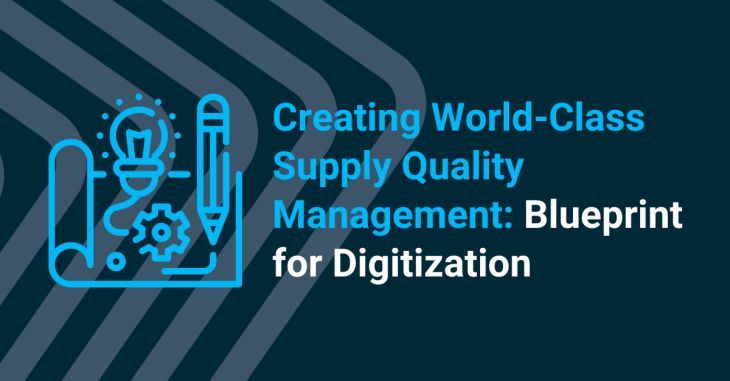Creating World-Class Supply Quality Management: Blueprint for Digitization

Digital transformation integrates innovative technologies, talent, and processes to enhance business operations and customer satisfaction. In the Life Sciences industry, improving supplier quality management is vital for patient safety and product quality. Prioritizing digital transformation in this area is essential due to suppliers’ significant impact on organizations.
Data Visibility: Achieving comprehensive data visibility across the supply chain is critical. By integrating the supplier management system with the enterprise Quality Management System (EQMS), ERP, and CRM systems, organizations can create a unified view of data.
On-the-Go Data Accessibility: Access to data should be seamless and flexible. Leveraging a cloud-based, mobile-ready platform allows stakeholders to retrieve information from suppliers anytime and anywhere. Whether it’s reports, approvals, or alerts, real-time access enhances efficiency, prevents delays, and supports business continuity.
Expandability: In a rapidly evolving technological landscape, scalability is essential. Organizations should adopt digital tools that can adapt to changing needs. Whether expanding globally, opening new locations, or adjusting risk assessment criteria, scalability ensures future-proof solutions. Adding new suppliers, users, and locations becomes effortless, supporting business growth.
Adaptive Workflows for Efficiency: Legacy software often imposes rigid workflows. To be effective, organizations need a radical approach. Custom workflows tailored to specific metrics allow for agility and responsiveness. Automation streamlines processes, reduces manual effort, and ensures efficient supplier management.
Risk-Informed Supplier Management: The supplier qualification process sets the stage for success criteria and risk identification. Integrating the supply management system with a risk management solution simplifies proactive risk reduction. Beyond risk mitigation, this integration fosters a quality culture that spans the entire supply chain.
Insights-Driven Decision Making: Predictive analytics streamlines decision-making. Insights drawn from enterprise-wide data offer valuable suggestions and recommendations. Balancing supply and demand across the value chain becomes more efficient. Early communication with suppliers regarding potential issues or non-conformances is facilitated. Leveraging predictive analytics for demand forecasts aids inventory management and capacity planning, enhancing supply chain communication and problem resolution.
Collaboration and Synergy: Digital transformation extends beyond technology. Collaborative efforts among teams are essential. Effective supplier management requires cross-functional alignment, shared goals, and transparent communication. By fostering collaboration, organizations can optimize their digital journey and drive continuous improvement.
How Rhythm fits into this:
Rhythm Innovations plays an important role in facilitating the digital transformation of the supplier quality management industry. The company’s expertise lies in seamlessly integrating innovative technologies to enhance business operations and customer satisfaction.


